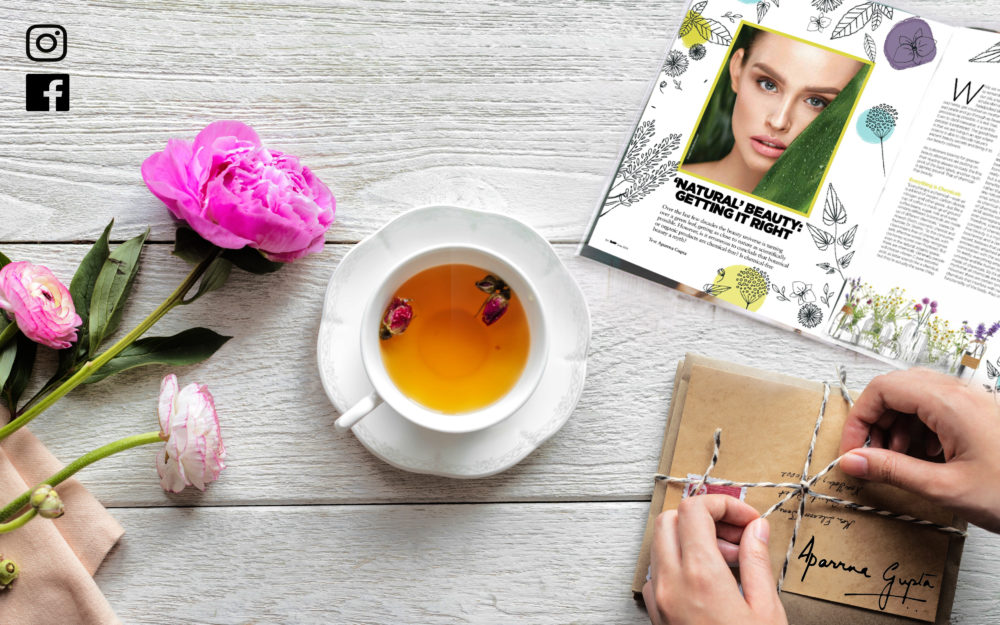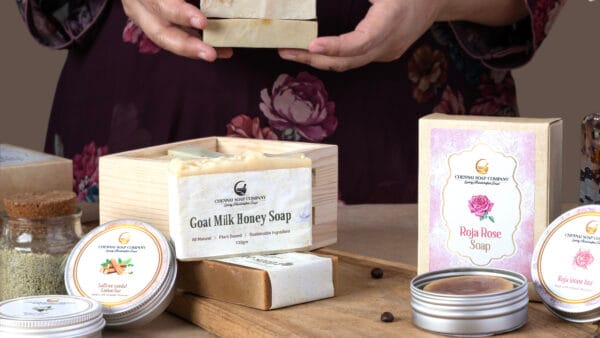Over the last few decades the beauty universe is turning over a green leaf, getting as close to nature as scientifically possible. However, it’s erroneous to conclude that botanical or organic products are chemical-free?
While we would like to romanticise that our oils, creams and scrubs derived from handpicked blooms and herbs, get crushed on mortar and pestle and goes through as fewer processes as possible, it is not true. Even to distil rosewater, a scientific process is embraced. The good news is that we are living in an age where science is able to decode nature’s ancient beauty secrets and bring it to our beauty cabinets. As customers looking for greener, beauty alternatives are putting on their reading glasses to study the fine print of the back labels, another myth is gaining ground. That of chemical-free beauty?
Everything is Chemicals

“Everything is a chemical – even air is a blend of oxygen, carbon dioxide, nitrogen and other gases. What Just like a cup of coffee is made up of ground coffee beans, sugar, milk and water, similarly different botanicals are made up of different chemicals,” states Dr Aneesh Sheth, cosmetic chemist and founder, Dr. Sheths. “To the consumer – cleans means free of chemicals, safe, effective and words I recognise (so honey scores over fructose). But even in the natural, organic space, there are chemicals. Generally, people will choose Vitamin C over ascorbic acid, as latter sounds like a chemical, but they’re actually the same thing. Take, for instance, water is as natural as it gets. It is there in nature and it is within us, and each molecule is made of two atoms of hydrogen and one oxygen.”
What is Chemical-free Beauty?

In the beauty industry, when people say that a product is chemical-free, they mean that it is free of the harmful synthesized chemicals and carries the constituent natural/organic chemicals in permissible proportions, explains Dr Neena Chopra, Director of Beauty and Technical, Just Herbs, an Indian beauty brand that’s based on ayurvedic formulations. So green beauty is not really a line of chemical-free products but a range that tries to harness the benefits of naturally-occurring chemicals rather than synthetic ones. “Name any naturally occurring substance, the ones which general public perceives as chemical-free; they are made up of chemicals. Honey contains glycolic acid, apples contain malic acid and even pomegranate contains potassium. Therefore, scientifically speaking, the concept of chemical-free or chemical-free beauty is a myth.” Dr Chopra, a biochemist and a certified naturopathy expert, believes that people have erroneously attached a certain negative connotation with the word ‘chemical’.
“In reality, everything around us – the universe and the human body – is made of chemicals. So it’s definitely a myth that all chemicals are bad for us. However, there are certain synthesized chemicals that interfere with natural functionality of the body. Also, overusing any chemical has a disturbing effect on the natural proportions of our body. For example, we all have iron in our body and it has certain advantages. If we have an overdose of synthesized iron, it can even lead to seizures. So, all our chemical consumption should be in a well-balanced and proportioned manner.”
The first step that every conscious consumer should take is to understand that naturally occurring substances are also chemicals. “All the polyphenolic compounds like pomegranate, green tea, etc. are all good for the skin and they are chemicals. Secondly, chemicals have a pivotal role in the beauty industry. Everything that constitutes a beauty product is nothing but chemicals that have been mixed in certain proportions and have certain remedial effects.”
Naturally-occurring versus Synthetic

Natural chemicals are simply the ones produced by nature without any human intervention. Synthetic chemicals are made by humans using methods different than that nature uses, and these chemical structures may or may not be found in nature.
In his beauty line, Dr Sheths, he captures of safe and effective ingredients that work on Indian complexions. On the natural versus synthetic debate, he is neutral and believes that a chemical is a chemical, and it will perform its duty as asked regardless of the source. For instance, vitamin C will be an antioxidant regardless of whether it comes from lemon, orange or a lab. “Salt is a ‘naturally occurring’ chemical that’s present in seawater. If I evaporate the sea water and get salt, it’s natural. If I do this in a controlled environment with flasks and beakers, it becomes ‘chemical’. At the end of the day, salt will always be sodium chloride. It will be very difficult for me to identify where it came from. Where I can tell whether it’s from the Himalayas or the Arabian Sea is when it’s in a blend – if there are other minerals present with it (which makes it a blend, and not purely salt) – that gives me clues as to its origin.”
The only cause of worry in synthetic chemicals is that their composition can be altered by human interventions, apprises Dr Chopra and adds how this potentially carries the hazard of interfering with our structure, which is designed to adapt to set-composition of every chemical. Are there some synthetic chemicals which are better and safer than their natural counterparts? Absolutely, says Dr Chopra and adds that depends on the proportional composition of the synthetic chemical. “For example, synthetically produced Ascorbic acid or Vitamin C is usually as safe as it natural counterparts. Moreover, the synthetic extract of ascorbic acid allows us to manually fix its composition in a product depending on an individual’s type and acceptability of it.”
Green Beauty
Consumer apprehensions regarding ‘artificial’ (synthesized) chemicals are driving even the mainstream brands to look for greener chemicals. While many would attribute the rise in green beauty to Ayurveda and oriental wellness inheritance, many also argue that it’s a natural progression in the world of science, where newer botanicals are being observed and their natural chemical is being decoded to determine their youth-preserving, skin-brightening and other cosmetic benefits. Shubhika Jain, founder of Ras Luxury Oils, believes that nature holds the answer to our skin woes. “Customers world over are preferring natural beauty products as now there are so many alternatives within the green brigade. When I call my brand, natural, I declare that I don’t use any synthetic fragrances or chemicals. Everything is nature-derived.”
Going green is more of a lifestyle choice than a concern for skin safety per se as one doesn’t need to be scared of chemicals per se, but their presence in an unbalanced proportion. So what many end-users are wary of are the mass market brands who resort to the uneven proportion of synthesized chemicals in their products to provide instant or immediate results. If anything contains organic chemicals in permissible amounts or synthetic compounds that don’t interfere with the natural functionality of our human body, there is nothing to be scared of.
The article was first published in Hair magazine






